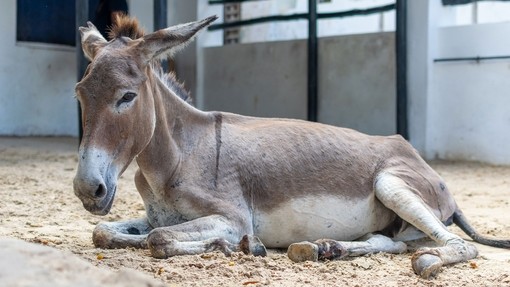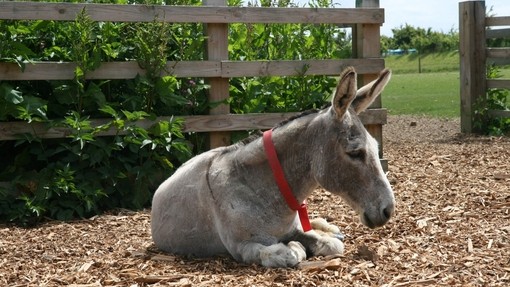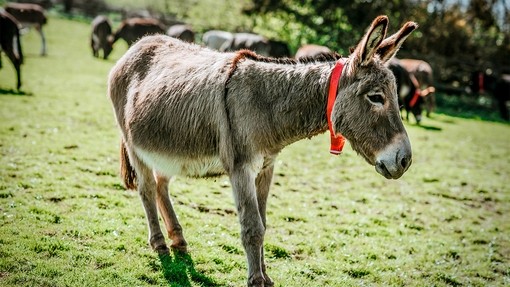Why is it important to control worms?
Worms live in your donkey’s body, draining their nutrients and sometimes causing damage to the various organs that they can be found in.
Donkeys that are heavily affected by worms can fail to gain or maintain weight and may be in poor condition. However, even without these signs it is important to follow a worm control programme.
Reducing the number of worms is dependant on interrupting the life cycle of the worm to reduce pasture contamination and also using wormers effectively to prevent resistance developing.
What is a faecal worm egg count test?
A faecal worm egg count test (FWEC) records the number and type of worm eggs seen in a sample of your donkey’s dung. A positive result indicates the presence of adult (egg-laying) worms. The count indicates whether your donkey is shedding a low or high number of eggs in its dung.
Not all donkeys grazing the same pasture have the same worm burden. Studies in horses (thought to apply to donkeys too) have found that about 80% of the worm population will be carried by just 20% of the animals. These individuals are known as ‘high-shedders’ and are the most likely to require treatment with a wormer.
FWEC tests are useful but they have their limitations:
- They do not accurately reflect the total number of adult worms
- They only provide a snapshot of the number and type of eggs released at the time of sampling
- They will usually miss pinworm eggs since they are not usually shed in faeces
- They only identify the potential burden of certain types and stages of worm
- You will need to conduct separate tests to check for tapeworm, lungworm and liver fluke, as these cannot be reliably be detected by a FWEC test.
How do I collect a sample for testing?
Ideally you should send a sample of your donkey’s dung for FWEC testing four times a year. This will help build a picture of your donkey’s ‘parasite status’ and the type and number of eggs they shed over time.
In the UK you can arrange a FWEC test through your vet. Alternatively, you can buy a kit from some equine or agricultural suppliers or they can be bought online. These kits normally contain all the necessary equipment (usually a glove, plastic bag or container, and labels), with prices starting around £5.50.
You can also send samples for FWEC testing to The Donkey Sanctuary in-house laboratory. Faecal egg counts for donkeys and mules can be carried out by our in-house laboratory and submitted by owners using the forms available on this page. We do not charge for this service but donations are always greatly appreciated. A donation between £5 and £10 per donkey is suggested to cover costs of running any laboratory tests.
Submit a faecal worm egg count to The Donkey Sanctuary
When packaging and sending samples, follow local or national rules on posting hazardous materials.
When you have the results, seek advice from your vet or a Registered Animal Medicines Advisor (SQP) on whether your donkey needs to be given a worming treatment.
How to use a wormer?
Wormers come in several different forms: pastes, gels, liquids, tablets and granules. Some can be administered via the given dosing syringe while other products may need to be mixed into a small feed.
Although it seems like there are lots of products to choose from, there are a limited number of ‘active ingredients’ (drugs) which are sold under several different trade names (brands). If your vet suggests a worming treatment is needed they will be able to help advise on the most appropriate product to use.
Some equine or agricultural suppliers will have a Registered Animal Medicines Advisor who are also qualified to give advice on worming control programmes and to prescribe some of the wormers.
Before worming you must know your donkeys weight so that you can give the correct dose. Underdosing (giving too little) will mean there is not enough of the drug to kill all worms that are targeted. Drug-resistant worms will survive and eventually multiply. Over time, as ‘resistance’ develops, this can affect how well a drug works. For this reason, you should round up your donkey’s weight to the nearest 50 kg when giving wormers.
See The donkey weight estimator for more information on how to estimate your donkey’s weight.
Step-by-step guide to administering a wormer
- Set up the tube to the correct dose for you donkey’s weight
- Stand next to your donkey and guide the syringe into the mouth, point it to the back of the tongue and press the plunger to dispense the wormer.
- Observe your donkey to ensure the wormer is swallowed and isn’t spat out.
- If this isn’t possible the paste can be added to a small amount of feed. Ensure the food is completely consumed.
Useful information
- As with any drugs or medication, keep wormers out of the reach of children, do not store them near food and drinks and keep children away from the area when you are giving wormers to your donkeys.
- Equine wormers are dangerous to dogs, you should never give your dog a wormer that you use for your donkey. Store equine wormers out of reach of dogs and do not allow dogs in the area where you are giving wormers to your donkeys.
- Dispose of containers safely and appropriately.
Managing the environment
While the appropriate use of wormers can help to reduce pasture contamination and treat clinical disease, it only has an impact on the parasites within the animal. The vast majority of parasites are found in the environment so control of this population is essential too. Strategies you can use to control worms in the environment:
- Rotating paddocks to rest the land can help break the lifecycle of some of the worms.
- Poo-picking fields regularly (at least twice a week) will interrupt the worm’s life cycle. It will reduce the number of worm eggs that could hatch and potentially infect your donkey.
- Minimising ‘stocking density’ or the number of animals kept together in the same area.
- Grazing cattle or sheep on your donkeys’ pasture can reduce the number of worm larvae that could potentially infect them.
- Rotating the type of drug used when worming, and keeping a record.
- Avoid spreading donkey dung back on grazing land – donkey manure will need to be composted for a minimum of six weeks with regular turning and maintenance at a minimum temperature of 50 – 70°C in order to kill off worm eggs.
- Harrow pasture only in hot, dry weather. If it is hot and dry eggs will be destroyed, but in mild, damp weather harrowing could increase the chance that your donkey may pick up infective larvae.
The donkey worming calendar
Take dung samples for FWEC testing twice during the spring/summer season. The results will guide decisions on whether your donkey needs worming. Most vets and laboratories only run checks for redworms and roundworms as standard. While this is enough for most donkeys, if you have concerns about the health of your donkey or you have foals, youngstock, or pregnant or lactating donkeys, request a full-profile analysis to cover a wider range of parasites. Ask about lungworm and liver fluke checks if your donkey grazes with other animals and, in the case of liver fluke, if your land is wet and marshy.
Take a dung sample for FWEC testing and speak to your vet about treating for tapeworm. There are currently no accurate ways of detecting tapeworm burdens in donkeys. If your donkey’s FWEC test results are high, your vet or Registered Animals Medicines Provider will be able to recommend a suitable product to use.
Winter weather conditions are not favourable for the development of some parasites, so small redworms have developed a unique survival strategy. Immature larvae, ingested while grazing, travel to the gut, burrow into the gut lining, and lie dormant there until the weather improves and they can continue their development. These larvae are known as ‘encysted’. At this stage, the larvae are immature and not laying eggs, so there is no way of detecting how many might be hiding away in your donkey’s gut lining.
The larvae can erupt from the gut in large numbers, which can have serious consequences and will likely make your donkey very ill. Traditionally, the highest risk period for the larvae to start emerging was late winter or early spring. However, due to changes in our climate, the pattern of emergence has become less predictable.
Your vet or Registered Animals Medicines Provider will be able to recommend a suitable treatment for encysted cyathostomins (small redworm larvae).
Different rules apply to foals, sick donkeys and pregnant or lactating females. Seek advice if you are planning to worm any of these.




